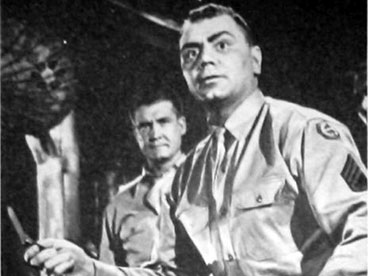Over his 95 years, Ernest Borgnine (1917-2012) was known for the vast range of roles he played. On the silver screen he was villainous Fatso Judson in From Here To Eternity and gave an Oscar-winning performance as the butcher Marty Pilettia. He was television’s beloved Lieutenant Commander Quinton McHale and the voice of a cartoon “mermaid man.”
In celebration of this versatile actor’s life, below is an abridged version of writer Dean Jennings’ 1955 article, which was published in the Post just eight months before Borgnine won the Oscar for his performance in Marty. To read or download the entire article, click here.
August 27, 1955—In a rented bungalow on a side street in North Hollywood there lives a 215-pound, bearish man who started life with the improbable name of Ermes Effron Borgnine.
Variously called “Ernie,” “Duke” or even “Bugs,” he is a shaggy-haired, paunchy man of thirty-eight with a relief-map face that is not apt to raise the blood pressure of young, lovelorn maidens. He drives an old car, and wears ready-made suits. His conception of pleasure and comfort is to sprawl on the floor every night with a can of cold beer, and gape at his television set. His wife picks out his neckties, and his closest friends are a plumber and an insurance salesman.
He has a tendency to doze off in soft chairs after a heavy meal. When his wife is out, he doggedly mops the floors, cooks up a batch of spaghetti or yaks over the back fence with the neighbors. He doesn’t know any movie stars, and when he sees one he is likely to feel self-conscious. Thus, except for his size, he is more or less the average man.
It is surprising and perhaps a little aggravating to some that plain and homely Ernest Borgnine is already being mentioned for an Academy Award as the result of a classic performance he gave as a kind but bumbling butcher in “Marty,” a picture which won the Cannes Film Festival award last spring.
No one in Hollywood can put a definitive finger on the elusive quality that makes Borgnine’s villains so remarkably real. When he impales a man on a pitchfork in “Violent Saturday” the fury shows in his eyes, and the customers gasp and recoil in their seats. In “Bad Day at Black Rock” he forces Spencer Tracy’s jeep over a cliff, and his face has the chilly blankness of every murderer since Cain.
Actually Borgnine is an intensely shy, sensitive, and often lonely man who is never satisfied with his work, and who is not convinced that he has great talent.” Ernie’s just a big St. Bernard who wants to be patted,” one acquaintance says. But among his nonprofessional friends the feeling persists that his screen violence is really a safety valve for a rebellious nature.
[However] Borgnine is not entirely subdued and permits himself an occasional outburst. Some time ago, while he was pacing the floor in his New York apartment and trying to memorize a role, a pianist began pounding the keys in an adjoining flat. The walls were thin, and with each fortissimo Borgnine stepped up his furious pacing. His patience finally ran out and with a mighty swing he drove his fist through the apartment wall. The startled pianist fled to the safety of the street. Borgnine later fibbed to his wife, Rhoda, that he had fallen off a ladder, and it was more than a year before he sheepishly told her the truth.
“Ernie has always learned the hard way,” says [his agent] Paul Wilkins, “but he doesn’t make the same mistake twice. When he first came to Hollywood, my secretary called him one morning and told him he had fifteen minutes to be at Columbia on a rush call. ‘Well,’ Ernie told her, ‘you advise Mr. Wilkins for me that I have no car, and if he wants me at the studio he’d better come and get me.’ I called him right back. ‘Look, boy,’ I said, ‘ I’m not a cab company. It’s tough enough for an agent to get jobs for actors without having to carry them there too. Let’s get that straight right now.’ Ernie was silent for a moment and finally said, ‘Oh, I guess you’re right.’ He was at Columbia in fifteen minutes and he got the part.”
Borgnine himself can laugh at these once-thorny episodes now and credits an old friend, a New Haven plumber named Joe Simone, with providing the Philosophical clincher. Not long ago he and Joe were driving along a country road in the latter’s car, which, as Borgnine puts it, was “rattling and shaking like a bucket of bolts.” “Joey, Joey!” Borgnine protested. “How can you stand all that terrible noise? Aren’t you afraid the heap will fall apart?”
“No,” said Joe. “I just turn up the radio louder.”
[His career began when his mother] said casually one day, “you always liked making a darn fool out of yourself. Why don’t you take up acting?”
Borgnine still considers her proposal a provocative non sequitur. He went along with her quaint reasoning, took his GI benefits and enrolled in the Randall School of Drama at Hartford. On his first day in class, he was asked to read aloud a passage containing the word “diamonds.”
“Mr. Borgnine,” the teacher scowled, “how did you pronounce that word?”
“Dimonds,” he grinned.
“The word, Mr. Borgnine, is d-i-a-m-o-n-d-s. Pronounced dye-a-monds.”
Borgnine’s blurting reaction to that was a common cuss word frequently heard aboard cruisers and destroyers.
The classroom rocked, but the teacher didn’t blink. ” Mr. Borgnine,” she said, “if you apply such strong feeling and pronunciation to all your reading, you will have no trouble as an actor.”
To download the full version click here.
[embedpdf width=”700px” height=”900px”]http://www.saturdayeveningpost.com/wp-content/uploads/satevepost/borgnine.pdf [/embedpdf]
Become a Saturday Evening Post member and enjoy unlimited access. Subscribe now




Comments
Nice to see this piece by my father, who wrote many articles on Hollywood stars for the magazine in the 1950s.